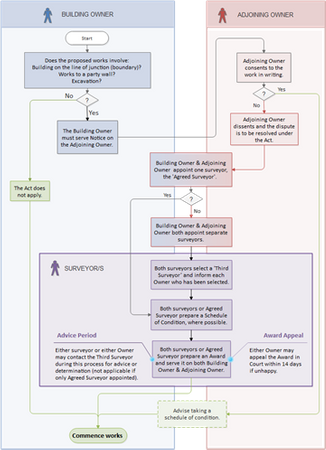How Does Party Wall Legislation Affect Commercial Property?
How Does Party Wall Legislation Affect Commercial Property?
If you are planning to carry out building works to your commercial premises that affect a party wall – i.e. a shared wall or other structure between two adjoining properties – you will need to consider your legal responsibilities under the Party Wall Act 1996. Chances are you’ll have many questions since this is a complex area of law. An independent party wall surveyor is the best person to expertly guide you through the statutory process.
One of the main purposes of the Act is to protect Adjoining Owners from any potential damage to their property resulting from works carried out by the Building Owner next door, and by notifying them of any proposed works and allowing them to comment.
Briefly, building works that fall within the remit of the Party Wall Act fall within three categories.
- Section 1 of the Act covers the construction of new walls on or astride a boundary that is not already built on, for example in the case of building extensions
- Section 2 of the Act covers alterations, repairs, demolitions and reconstructions of existing party structures, such as would be required for loft conversions or DPC insertion
- Section 6 of the Act covers excavations, e.g. for footings, foundations or drainage, that are lower than the Adjoining Owner’s structure, e.g. for basement conversions
Each section has its own requirements for notification and the proposed works can fall into more than one category. The maximum notice period is 2 months but the process can take much longer.
Anyone keen to learn more about party wall legislation and procedure in detail can download this in-depth guide published by the Royal Institution of Chartered Surveyors (RICS) here. For a quicker look, this handy flowchart shows an overview of the process that must be followed:

Source: Faculty of Party Wall Surveyors
Party Wall Notices must be served by the Building Owner proposing to undertake construction works. This gives Adjoining Owners the legal right to consent in writing, dissent and appoint an agreed surveyor, or dissent and appoint their own surveyor. In many cases, if the affected neighbours give permission in writing that works can commence, there is usually no need to appoint a surveyor.
However, if the parties are deemed to be ‘in dispute’, one or several surveyors must be instructed to prepare a Party Wall Award, based on a Schedule of Condition of the Adjoining Owner’s property to protect the interests of all concerned. Among other things, the Award has the power to determine the timing, method of work and cost apportionment relating to the works.
It should be pointed out that leaving the Party Wall Notices too late can be a potentially expensive mistake. Informal verbal agreements with neighbours can be forgotten quickly should relations sour. There are penalties for non-compliance and an injunction can be taken out against the Building Owner to stop unauthorised works. However, one definite advantage of the legislation is that Adjoining Owners can ultimately not frustrate or unreasonably delay your permitted building plans beyond what is set out in the Act.
